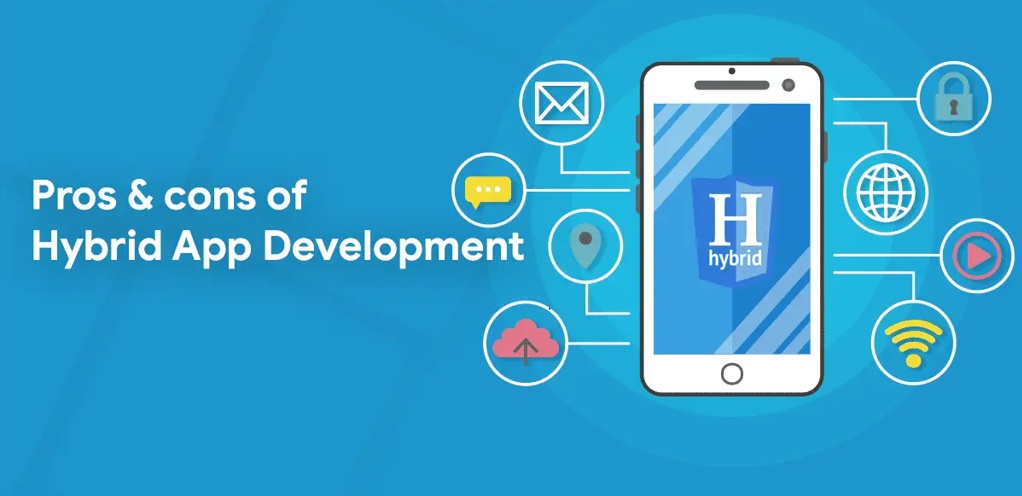Choosing the appropriate technique is critical for success in the shifting landscape of mobile app development. Hybrid app development has grown in popularity in recent years, providing a mix between native and web applications. As we approach 2024, it is critical to weigh the benefits and drawbacks of hybrid app development in order to make informed judgments. In this piece, we will look at the primary benefits and drawbacks of hybrid app development, as well as provide insights into the changing environment of mobile application technology.
Pros of Hybrid App Development:
-
Cross-Platform Compatibility: Hybrid app development companies allows developers to write code once and deploy it across multiple platforms. This not only saves time and resources but also ensures a consistent user experience on both iOS and Android devices.
-
Cost-Effectiveness: Building a hybrid app can be more cost-effective compared to developing separate native apps for different platforms. With a single codebase, development and maintenance costs are reduced, making it an attractive option for businesses with budget constraints.
-
Faster Development Cycle: The use of web technologies such as HTML, CSS, and JavaScript accelerates the development process. Developers can leverage existing web development skills to create mobile applications swiftly, meeting tight deadlines and getting products to market faster.
-
Access to Native Device Features: Hybrid frameworks provide access to native device features through plugins and APIs. This allows developers to incorporate features like camera access, GPS, and push notifications, providing a native-like experience to users.
-
Easier Maintenance and Updates: Updating a hybrid app is more straightforward as changes can be made to the codebase, and updates are pushed to users without requiring approval from app stores. This ensures a seamless and efficient maintenance process.
Cons of Hybrid App Development:
-
Performance Concerns: One of the longstanding challenges of hybrid app development is performance. While advancements have been made, hybrid apps may still not match the performance levels of native apps, especially for graphics-intensive or complex applications.
-
Limited Access to Native APIs: While hybrid apps provide access to many native features, there can be limitations. Some advanced or platform-specific features may not be easily accessible through hybrid frameworks, requiring additional effort to implement.
-
Dependency on Third-Party Tools: Hybrid app development often involves the use of third-party tools and frameworks. Depending on these tools can introduce dependencies and may lead to compatibility issues or delays in adopting the latest updates from mobile operating systems.
-
User Interface Challenges: Achieving a seamless and native-like user interface can be challenging in hybrid apps. Design elements may not behave consistently across platforms, impacting the overall user experience.
-
App Store Approval Process: While updates are easier to deploy, getting initial app store approvals can be challenging. App stores may have specific requirements, and ensuring compliance can be a time-consuming process.
FAQs:
1. Is hybrid app development suitable for all types of applications? Hybrid app development is well-suited for a wide range of applications, including business apps, content-based apps, and apps with moderate computational requirements. However, for graphics-intensive or highly specialized apps, native development may be preferred for optimal performance.
2. How do hybrid apps handle offline functionality? Hybrid apps can leverage local storage capabilities to provide offline functionality. Data caching and storage techniques enable users to access certain features or content even without an internet connection. However, the extent of offline functionality may vary based on the app's design and requirements.
3. Are there notable examples of successful hybrid apps in 2024? Yes, several successful apps in 2024 are developed using hybrid frameworks. Examples include the Starbucks app, Instagram, and the Untappd beer tracking app. These apps demonstrate that hybrid development can achieve a balance between cross-platform compatibility and a seamless user experience.
Conclusion:
As we approach 2024, hybrid app development remains a feasible option for many firms looking to easily reach a large audience. Understanding the benefits and drawbacks is critical for making informed judgments that are tailored to unique project requirements. Developers can choose the strategy that best corresponds with their aims by evaluating the benefits of cross-platform compatibility and cost-effectiveness against the limitations of performance and native feature access. This ensures successful mobile app deployment in the ever-changing tech ecosystem.


No comments yet